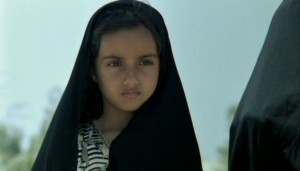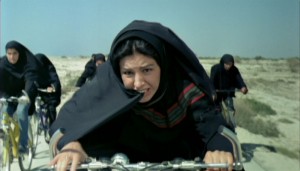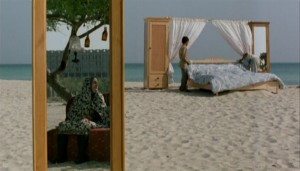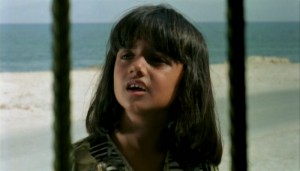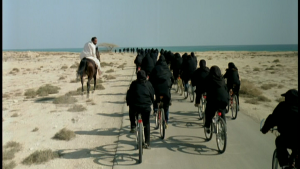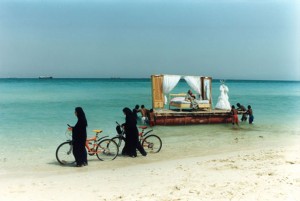It’s inevitable that today’s counterculture has to learn the same hard lessons that my generation learned half a century ago, but in a style all its own. For me, two of the key lessons of Eco Village are (1) utopian communes are apt to turn into nightmares once the return of the repressed (i.e., whatever one is escaping from) rears its ugly head, and (2) in any competition between leftist politics and sadomasochism, the latter is always likelier to win, if only because, alas, loud and ugly heads (such as Trump’s or Fassbinder’s or von Trier’s) are more apt to sell tickets than quiet acts of compassion, Fortunately, the style brought by writer-director Phoebe Nir and her cast (lead actress Sidney Flanigan and many others) to these lessons gives this scattershot picture a punch of its own, and lots of songs to slide us past all the narrative clutter.
Read more
Written for Sight and Sound on August 5, 2015. — J.R.
The Day I Became a Woman (2000)
Marziyeh Meskini’s first feature, shot exclusively in exteriors on gorgeous Kish island in Iran, tells three successive tales of rebellious female empowerment at separate ages: Havva enjoys sharing tamarind pulp and a lollipop with a male friend a few hours before she turns nine and officially loses her freedom by becoming a woman. Ahoo fiercely pedals her bicycle with other women while her husband and other male relatives on horses try to restrain her. Houra, a dowager, buys a beach full of home furnishings at a nearby mall and has them hauled out to sea. All three tales are both allegorical and sensual, and the leisurely pacing of the first is followed by the constant motion of the second. The Surrealist deconstruction of domestic space in the third brings all three characters together, and once again turns the censorship rules into creative opportunities. (Jonathan Rosenbaum)
Read more
2021 note: In part because I had unkind things to say about his first feature in 1974, writing at the time from Paris, my relations with Bertrand Tavernier (1941-2021) tended to be strained, even though both of us periodically tried to overcome this rift — and, to his credit, he was the one who made the first friendly gesture, inviting me to join him for a meal in Chicago many years later.. Round Midnight is probably the film of his that has affected me the most, which is why I’m reposting this piece now.
Part of my 1987 application for the job of film reviewer at the Chicago Reader consisted of writing three long sample reviews for them in March and/or April — only one of which was published by them (Radio Days), although, as I recall, they paid me for all three. (Writing these pieces in Santa Barbara, I was limited in my choices of what I could write about.) I only recently came across the two unpublished reviews, of Platoon and Round Midnight, in manuscript, although I recall that I did appropriate certain portions of them in subsequent reviews. Otherwise, the first publications of these pieces are on this site. Read more
This is the 11th one-page bimonthly column that I published in Cahiers du Cinéma España; it appeared in their March 2009 issue. — J.R.
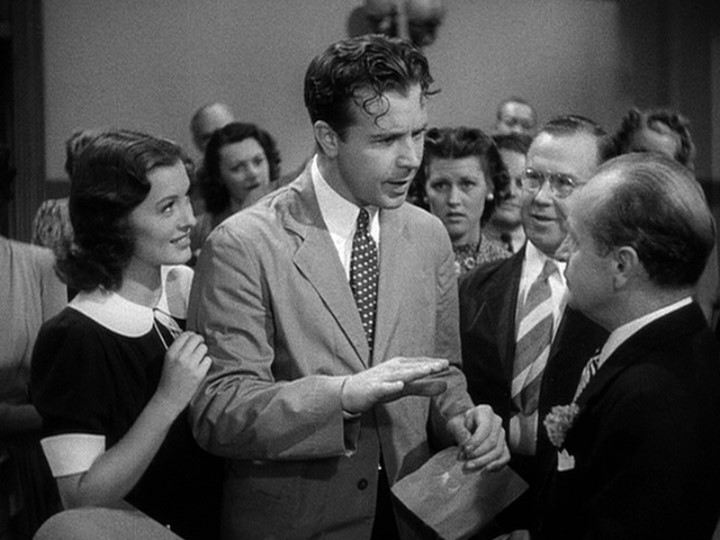
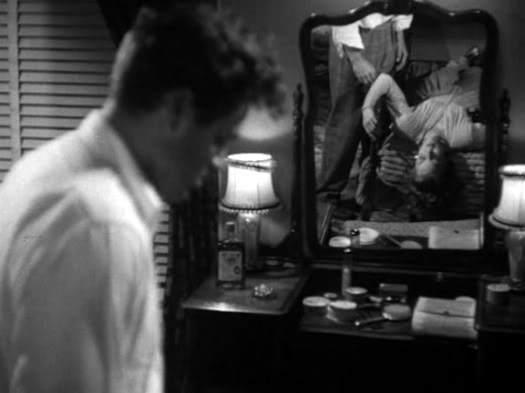
Tomorrow I start teaching the final semester of a course and film series I’ve been offering at Chicago’s School of the Art Institute devoted to world cinema of the 30s, 40s, 50s and 60s. To provide a segue between the Depression of the 30s and the 40s, I’ll be starting with a double feature devoted to economic desperation, Preston Sturges’s Christmas in July (1940) and Edgar G. Ulmer’s Detour (1945).
Two of the most popular films I showed last fall were Lubitsch’s The Man I Killed (1932) and McCarey’s Make Way for Tomorrow (1937). I selected them before last year’s economic recession started, and the congruence and relevance of certain themes — remorse about warfare and spurious patriotism, crowded family apartments and neglect of the elderly — probably added to their appeal. But the contemporary impact of films is always difficult to predict. I’m convinced that a significant part of what inspired Clint Eastwood to make Flags of Our Fathers and Letters from Iwo Jima was the U.S. occupation of Iraq, but this relevance wasn’t discussed in the press. Read more
From the Chicago Reader (July 29, 2005). — J.R.

The World
**** (Masterpiece)
Directed and Written by Jia Zhang-ke
With Zhao Tao, Chen Taishen, Jing Jue, Jiang Zhongwei, Huang Yiqun, Wang Hongwei, Liang Jingdong, Ji Shuai, and Alla Chtcherbakova
The title of Jia Zhang-ke’s 2004 masterpiece, The World — a film that’s hilarious and upsetting, epic and dystopian — is an ironic pun and a metaphor. It’s also the name of the real theme park outside Beijing where most of the action is set and practically all its characters work. “See the world without ever leaving Beijing” is one slogan for the 115-acre park, where a monorail circles scaled-down replicas of the Eiffel Tower, the Taj Mahal, London Bridge, Saint Mark’s Square, the Leaning Tower of Pisa, the Pyramids, and even a Lower Manhattan complete with the Twin Towers. Extravagant kitsch like this may offer momentary escape from the everyday, but Jia is interested in showing the everyday activities needed to hold this kitsch in place as well as the alienation in this displaced world — and therefore in the world in general, including the one we know.
Jia, with his choreographed wide-screen long takes in long shot, may be the best cinematic composer of figures in landscapes since Michelangelo Antonioni. Read more




